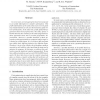Free Online Productivity Tools
i2Speak
i2Symbol
i2OCR
iTex2Img
iWeb2Print
iWeb2Shot
i2Type
iPdf2Split
iPdf2Merge
i2Bopomofo
i2Arabic
i2Style
i2Image
i2PDF
iLatex2Rtf
Sci2ools
108
click to vote
IPPS
2006
IEEE
2006
IEEE
On the impact of data input sets on statistical compiler tuning
In recent years, several approaches have been proposed to use profile information in compiler optimization. This profile information can be used at the source level to guide loop transformations as well as in the backend to guide low level optimizations. At the same time, profile guided library generators have been proposed also, like Atlas, Spiral, or FFTW, that tune their routines for the underlying hardware. These approaches have led to excellent performance improvements. However, a possible drawback of these approaches is that applications are optimized using a single or a limited set of data inputs. It is well known that programs can exhibit vastly differing behaviors for different inputs. Therefore, it is not clear whether the performance numbers reported are still valid for other input than the input used to optimize the program. In this paper, we address this problem for a specific statistical compiler tuning method. We use three different platforms and several SPECint2000...
Compiler | Distributed And Parallel Computing | IPPS 2006 | Low Level Optimizations | Profile Information |
Related Content
| Added | 12 Jun 2010 |
| Updated | 12 Jun 2010 |
| Type | Conference |
| Year | 2006 |
| Where | IPPS |
| Authors | Masayo Haneda, Peter M. W. Knijnenburg, Harry A. G. Wijshoff |
Comments (0)

